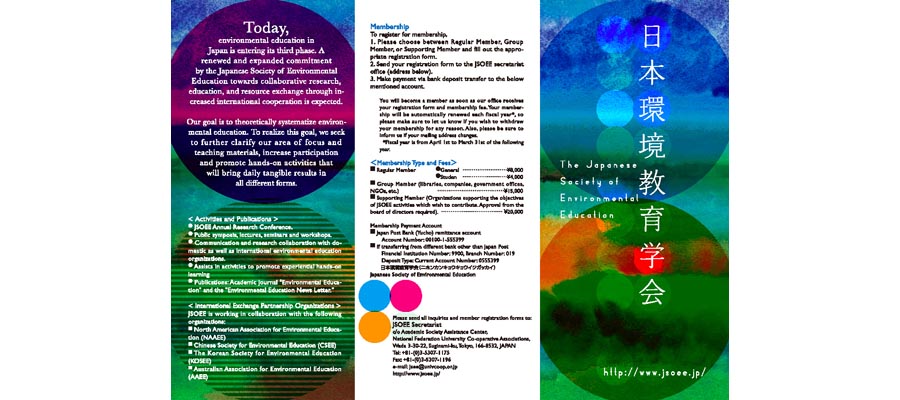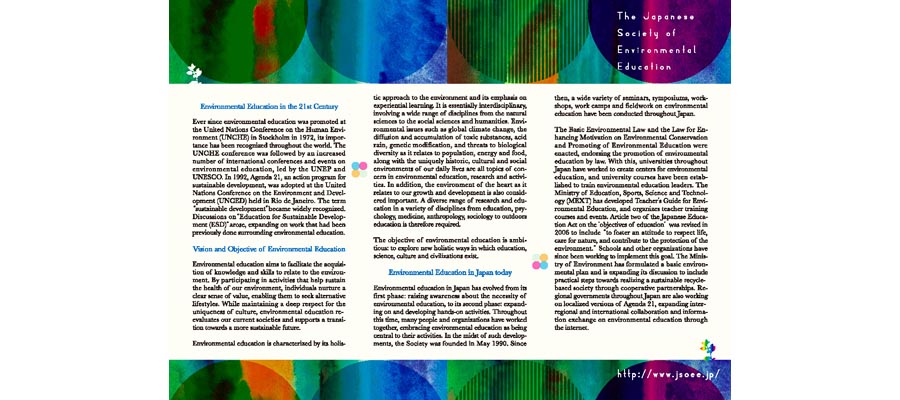- 詳細
- 親カテゴリ: English Page
- カテゴリ: English Pages of JSOEE
- 作成日 2011年3月06日(日曜)10:40
- 最終更新日 2014年5月17日(土曜)09:44
- 参照数: 20418
The Japanese Society of Environmental Education
Background
The importance of environmental education was globally acknowledged at the United Nations Conference on the Human Environment (UNCHE) held in Stockholm in 1972. UNCHE was followed by numerous international conferences and symposiums on environmental education hosted by such organizations as UNESCO and UNEP.
In 1992, Agenda 21, an action program for sustainable development, was adopted at the United Nations Conference on Environment and Development (UNCED) held in Rio de Janeiro. This action program stresses the importance of promoting environmental education for young people. The pursuit of deeper theories and broader practices of environmental education are among the most important tasks facing us as we aim to solve global environmental problems and build a sustainable society.
Aims
In order to contribute to a comprehensive development of environmental education, the Society will continue to promote theoretical studies and make proposals and recommendations based on analytical studies of past practices and experiences, and promote educational practices.The Society will thereby continue its mission, playing the leading role in environmental education in Japan.
Members
- teachers, researchers,college students, government workers, NPO/NGO staff, company workers,etc.
- 1751 (Personal member), 69 (Group member), 4 (Support member)- on March 31, 2010
Major projects of the society
- Annual academic conferences: Opportunities to exchange ideas and information.
- Publications (academic journals and newsletters): Resources to keep educators informed of current news and events.
- Symposiums, seminars and workshops (international and domestic): Examining topics in depth and sharing expertise.
- International and domestic collaboration with other societies and organizations: Working together to promote quality environmental education.
- Exchange of information through the Internet: Linking for success in environmental education.
- Local Branch Activities: Hokkaido, Kanto, Kansai, etc.
Goals of Environmental Education
Environmental education aims to help students and citizens understand the environment,acquire necessary skills, contribute to environmental conservation,develop their own values and create an alternative lifestyle. Environmental education is an essential endeavor for the re-evaluation of contemporary society, thereby helping us in the transition to a sustainable society.
Environmental education emphasizes comprehensive understanding of the environment and learning through experience. It is essentiallyinterdisciplinary, involving a wide spectrum of disciplines from the natural sciences to the social sciences and the humanities. It deals not only with environmental issues such as acid rain, climate change and loss of biodiversity, and related issues such as population, energy and food issues, but also with various problems related to local communities, historical and ethnic cultures,primary industries such as agriculture and forestry, and the necessities of life. Environmental education is charged with the crucial mission of exploring for an alternative education, science and civilization.
Environmental education in Japan
In Japan, environmental education originated in anti-pollution education and education for nature preservation during the period of high economic growth in the 1960s. In the latter half of the 1980s as the threat of environmental problems was becoming globally acknowledged and conservation issues were attracting more attention, the importance of environmental education became to be increasingly recognized by foresighted educators,researchers and policy makers.
In response to this heightening environmental awareness, the Japanese Society of Environmental Education, an academic organization,was founded in 1990. In cooperation with other educational associations founded at that time and with many environmental NPOs/NGOs, the Japanese Society of Environmental Education helped in many kinds of environmental education programs and projects in Japan. These nitiatives enabled environmental education to branch out in many directions.
A diversity of educational activities was established during the 1990s. The Ministry of Education, Science, Sports and Culture established a guideline for environmental education in 1991 leading to the introduction of environmental education in schools throughout the country.
Environmental education is now becoming more common in schools,and environmental in-service training programs for teachers have begun. Information exchange networks connecting schools have been enhanced and expanded. At teacher training colleges research centers for environmental education have been created which are examining interdisciplinary ideas and theories in cooperation with the Society.
The Basic Environment Act, enacted in 1993, explicitly endorses the promotion of environmental education. Public awareness of the importance of conservation along with administrative support helped the increasing expansion of environmental education in the 1990s. More and more local governments have developed environmental master plans, launched environmental learning centers, established training programs for future leaders and provided learning opportunities for the public.
The Law for Enhancing Motivation on Environmental Conservation and Promoting of Environmental Education was enacted in 2003,and the basic policy of the law was decided by the cabinet. United Nations Decade of Education for Sustainable Development (from 2005 to 2014) promotes our society’s activities.
The Fundamental Law of Education was renewed in 2006 and its Act 2 ‘Aims of Education’ says, ‘To build a corporative attitude to esteem life and nature, and to preserve environment.
Office of the society
JSOEE Secretariat
c/o Academic Society Assistance Center,
National Federation University Co-operative Associations,
Wada 3-30-22, Suginami-ku, Tokyo, 166-8532, JAPAN
Fax: +81-(0)3-5307-1196
e-mail: jsee atmark univcoop.or.jp
Brochure is available
Front pages (PDF 667KB)
Back pages (PDF 1.3MB)
Membership application form
Download (xlsx 14KB)








